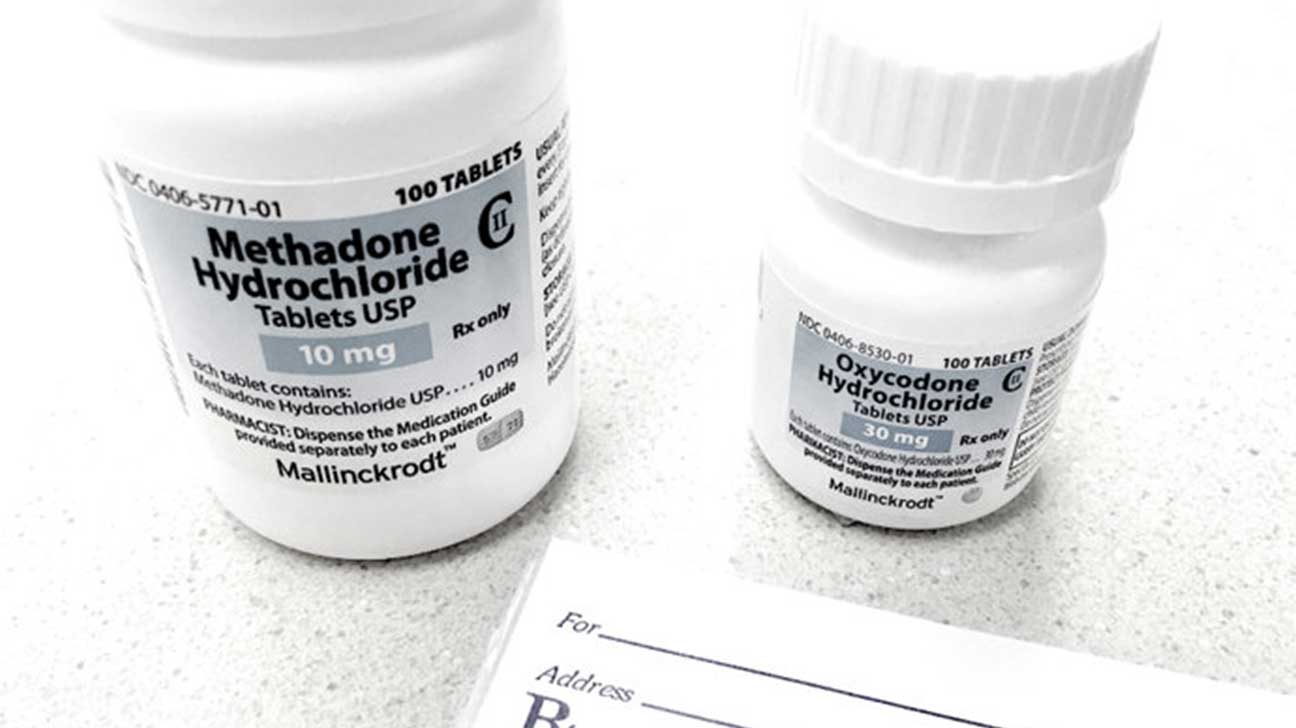
Methadone is an opioid addiction medication that can relieve pain and help treat opioid use disorder, in conjunction with behavioral therapy and substance use counseling.
Here, you’ll find more information about methadone, including potential side effects of methadone, risks, and answers to frequently asked questions about methadone.
Learn more about medication-assisted treatment
How Methadone Works
Methadone is a long-acting, full opioid agonist that binds to opioid receptors in the brain.
Taken daily, it can effectively treat opioid withdrawal symptoms and reduce cravings for other opioid drugs, such as heroin and oxycodone (OxyContin).
When taken as directed, it can be safe and effective for short-term or long-term use as part of a comprehensive treatment plan for opioid use disorder.
When Should You Start Taking Methadone?
Methadone is commonly used as maintenance therapy for opiate dependence. People who are opioid-dependent may begin methadone maintenance therapy (MMT) under clinical supervision.
Withdrawal management, a common reason for which medications for opioid use disorder like methadone, naltrexone, and buprenorphine (Suboxone) are utilized, is not necessary for people beginning MMT.
Methadone Dosing
The prescribed dose of methadone for any given person will depend on personal needs and attributes, including opioid dependence severity and other health-related factors.
Clinical guidelines for methadone maintenance programs suggest that methadone doses of 60 mg or greater are most effective for treating opiate addiction.
However, clinical guidelines also advise that doctors first begin patients on a lower, initial dose of 20 to 30 mg, and adjust this dosage as needed over time.
Average Dose Of Methadone
The average effective dose of methadone for opioid use disorder is between 60 to 120 mg per day. Dosing may be different for people who are prescribed methadone for pain relief.
Read more about the average dose of methadone
How Often Methadone Is Taken
Methadone is taken for opioid dependence once a day. Generally, it is administered in a closed setting—an inpatient treatment facility or methadone clinic — for close medical supervision.
Types Of Methadone
Methadone is manufactured in the form of a pill, liquid, or diskette. It is sold under generic and brand names, some of which are exclusively used for the treatment of chronic or severe pain.
Common brand name methadone products include:
Side Effects Of Methadone
Methadone is a powerful opioid agonist and central nervous system depressant. When taken, methadone may cause acute side effects such as drowsiness, dry mouth, nausea, and euphoria.
Read more about the side effects of methadone
Methadone And Itching
Severe itching after methadone can occur, but this is generally considered a serious side effect or adverse drug reaction.
Read more about methadone and itching
Methadone And Depression
Major depression and other mental health disorders are common among people who seek drug addiction treatment, including those who take medications like methadone for addiction.
Depression is not a common side effect of methadone.
People who take methadone may feel depressed as a result of co-occurring mental illness, environmental factors, or other personal factors.
Read more about how methadone effects depression
Methadone And Effects On Blood Pressure
Methadone is a depressant that can lead to hypotension (low blood pressure) in some people.
Increased blood pressure, or hypertension, is a sign of opioid withdrawal and may develop if someone tries to stop taking methadone too quickly or all at once.
Read more about the effects of methadone on blood pressure
Cardiac Effects From Methadone
Abnormal heart rhythm and other cardiac effects of methadone are uncommon. This can occur as a result of a drug interaction, opioid withdrawal, overdose, or an underlying cardiac condition.
Read more about how methadone affects the heart
Methadone And Effects On Weight
Changes in weight can occur while taking methadone. Methadone may cause bloating, swelling, and constipation, all of which can lead to minor weight gain.
Read more about how methadone affects weight
Other Effects Of Methadone On The Body
Methadone can cause a range of physical effects. The use of methadone may cause fatigue, leg swelling, skin problems, and hypotension, in addition to other effects on the body.
Methadone Treatment Duration
Methadone is a strong pain reliever and addiction treatment that can be taken for as long as a doctor sees therapeutic benefit in its use.
People with opioid dependence or opioid use disorder may safely take methadone for weeks, months, or years as an ongoing treatment.
Read more about how long you can take methadone
Does Methadone Cause Withdrawal?
Methadone can result in withdrawal syndrome if it is stopped too abruptly. It is habit-forming and can lead to physical dependence with chronic use, like many prescription medications.
Read more about withdrawal from methadone
Methadone Detox
Beginning a detoxification program for methadone is highly recommended for those who wish to stop taking methadone.
Methadone detoxification (detox) programs can offer treatment for withdrawal and help prevent potentially serious consequences such as dehydration, opioid cravings, and relapse.
Read more about how to safely detox from methadone
Can Methadone Lead To Addiction?
Methadone can be addictive. Taken in ways other than prescribed, methadone addiction can be dangerous. As a maintenance treatment, however, methadone can be effective for long-term use.
Risks Of Using Methadone To Treat Opioid Use Disorder
Methadone is not a risk-free medication. Like any medication, there are risks to methadone drug use.
Potential health risks of methadone may be communicated to patients prior to beginning methadone treatment for opioid use disorder.
Methadone Overdose
Taking a very high dose of methadone, or mixing it with other depressants (including alcohol), can lead to methadone overdose, which may cause serious breathing issues.
Without treatment, severe overdose can be life-threatening. Overdose can be treated with the opioid overdose-reversal drug, naloxone, also known as Narcan.
Read more about a methadone overdose
Long-Term Risks Of Methadone
Taken chronically, methadone can have effects on sleep, sexual function, mood, cognition, and cause physical dependence.
Read more about the long-term effects of methadone
Drug Interactions With Methadone
Methadone can interact with certain prescription and illicit drugs. Before taking methadone, tell your doctor about any other substances you’re taking to discuss potential interactions.
Read more about drugs that interact with methadone
Methadone Interactions With Other Substances
Some non-pharmaceutical substances like grapefruit juice can interact with methadone.
To prevent adverse effects, talk to your doctor about substances you should avoid while taking methadone.
Read more about how grapefruit juice can interact with methadone
Methadone FAQs
Having questions about methadone and methadone products is common. Find answers to frequently asked questions about methadone and what it does here.
Is It Safe To Take Methadone?
Yes. Methadone is safe when taken as directed by a licensed health professional. Side effects can occur and some health risks may apply.
Is Methadone Free?
Methadone isn’t free, but it is covered by many health insurance plans, including some Medicaid and Medicare coverage plans.
For those who are uninsured, methadone treatment may be available at little or no cost through certain healthcare providers, for patients who are eligible.
Does Methadone Get You High?
Methadone can produce euphoric effects in low to moderate doses. Taken as directed for drug addiction, euphoria from methadone shouldn’t cause severe disruption to a person’s treatment.
What Does Taking Methadone Feel Like?
Methadone may cause a person to feel drowsy, lethargic, and happy. Its moderate euphoric effects can result in a feeling of relaxation and positive well-being. It can also provide pain relief.
Read more about what methadone feels like
Is Methadone An Opioid/Opiate?
Methadone is a synthetic opioid drug. It can effectively blunt opioid cravings and prevent opioid withdrawal symptoms, due to the fact that it is chemically similar to other opioid analgesics.
Can You Take Methadone While Pregnant?
Methadone is a first-line treatment for heroin addiction and opioid use disorder in pregnant women. Methadone may be used during pregnancy and while breastfeeding.
Taking methadone while pregnant does come with certain risks, and may lead to neonatal opioid withdrawal syndrome in babies following birth.
Can Methadone Use Lead To Anger Issues?
During the early stages of methadone maintenance treatment, signs of emotional distress, including anger, may develop as a result of physical or psychological withdrawal.
Anger is not a common side effect of methadone, nor chronic methadone use.
Read more about anger issues from taking methadone
Does Methadone Interact With Antidepressants?
Methadone can interact with certain antidepressant medications, including:
- SSRI medications (e.g. Zoloft, Prozac)
- monoamine oxidase inhibitors (MAOIs)
- tricyclic antidepressants (e.g. amitriptyline)
- desipramine (Norpramin)
The severity of these interactions can vary depending on the type of antidepressant and other biological and health-related factors.
Read more about the interaction between methadone and antidepressants
Who Can Prescribe Methadone?
Methadone for opioid use disorder can only be dispensed by a medication-assisted treatment (MAT) practitioner as part of an opioid treatment program (OTP).
Read more about who can prescribe methadone
Find Methadone Treatment For Opioid Abuse And Addiction
Methadone is one of the leading treatments for opioid abuse and addiction, which is estimated to affect millions of Americans from all walks of life.
If you, a friend, or a family member is struggling with opioid abuse, we may be able to help. Call our helpline today to find methadone treatment options at a drug treatment center near you.
Addiction Resource aims to provide only the most current, accurate information in regards to addiction and addiction treatment, which means we only reference the most credible sources available.
These include peer-reviewed journals, government entities and academic institutions, and leaders in addiction healthcare and advocacy. Learn more about how we safeguard our content by viewing our editorial policy.
- Centers for Disease Control and Prevention (CDC) —Treatment for Opioid Use Disorder Before, During, and After Pregnancy
https://www.cdc.gov/pregnancy/opioids/treatment.html - National Alliance on Mental Illness (NAMI) — Mental Health Medications: Methadone
https://www.nami.org/About-Mental-Illness/Treatments/Mental-Health-Medications/Types-of-Medication/Methadone%C2%AE - Substance Abuse and Mental Health Services Administration (SAMHSA) — Methadone
https://www.samhsa.gov/medication-assisted-treatment/medications-counseling-related-conditions/methadone - U.S. Food and Drug Administration (FDA) — DOLOPHINE (methadone hydrochloride)
https://www.accessdata.fda.gov/drugsatfda_docs/label/2015/006134s038lbl.pdf - U.S. National Library of Medicine: MedlinePlus — Methadone
https://medlineplus.gov/druginfo/meds/a682134.html - U.S. National Library of Medicine — Methadone maintenance treatment - Clinical Guidelines for Withdrawal Management and Treatment of Drug Dependence in Closed Settings
https://www.ncbi.nlm.nih.gov/books/NBK310658/#part6.s1 - U.S. National Library of Medicine — The relationship between mood state and plasma methadone concentration in maintenance patients
https://pubmed.ncbi.nlm.nih.gov/11199952/


